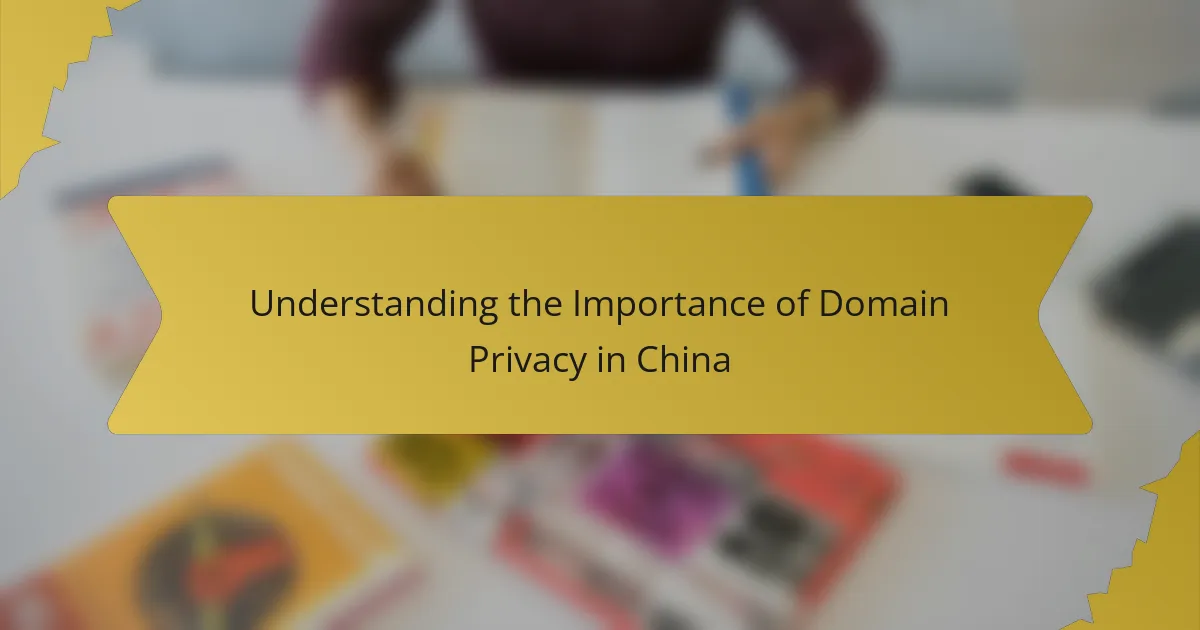Understanding the importance of domain privacy in China is essential for safeguarding personal and business information in an increasingly digital landscape. This protection not only helps maintain anonymity but also mitigates risks such as spam and identity theft, ensuring compliance with local regulations. Without domain privacy, individuals and businesses face significant vulnerabilities, including exposure to legal issues and unwanted solicitations.

Why is domain privacy important in China?
Domain privacy is crucial in China to protect personal information and maintain online security. It helps individuals and businesses safeguard their data from potential misuse and comply with local regulations.
Protection against data breaches
Domain privacy acts as a shield against data breaches by concealing the personal details of domain registrants. When domain information is publicly accessible, it can be exploited by cybercriminals for phishing attacks or identity theft.
By using domain privacy services, registrants can keep their contact information hidden, reducing the risk of unwanted solicitations and enhancing overall security. This is particularly important in a digital landscape where data breaches can lead to significant financial losses and reputational damage.
Compliance with local regulations
In China, compliance with local regulations regarding data protection is essential for businesses and individuals. The Chinese government has implemented strict laws that govern the collection and use of personal information, making domain privacy a necessary measure.
Failing to protect personal data can result in legal penalties and fines. Utilizing domain privacy services helps ensure that registrants meet these regulatory requirements while maintaining their anonymity online.

How does domain privacy work in China?
Domain privacy in China protects the personal information of domain registrants from being publicly accessible. This service helps maintain anonymity and reduces the risk of spam, identity theft, and other privacy concerns.
WHOIS data protection
WHOIS data protection involves the masking of personal details in the WHOIS database, which is a public record of domain ownership. In China, registrants can opt for privacy services that replace their contact information with that of the registrar or a proxy service. This ensures that sensitive information like names, addresses, and phone numbers remain confidential.
However, it’s essential to understand that while WHOIS data protection enhances privacy, it may also complicate domain recovery processes. If a domain owner loses access, proving ownership can be challenging without direct access to their information.
Registrar privacy services
Registrar privacy services are offered by many domain registrars in China to provide an additional layer of anonymity. These services typically include forwarding emails and masking personal details in the WHOIS database. Many registrars charge a nominal fee for these services, which can range from a few USD to over ten USD annually.
When selecting a registrar, consider their privacy policies and the extent of the protection they offer. Not all registrars provide the same level of service, so it’s advisable to compare options and read user reviews to ensure you choose a reliable provider.
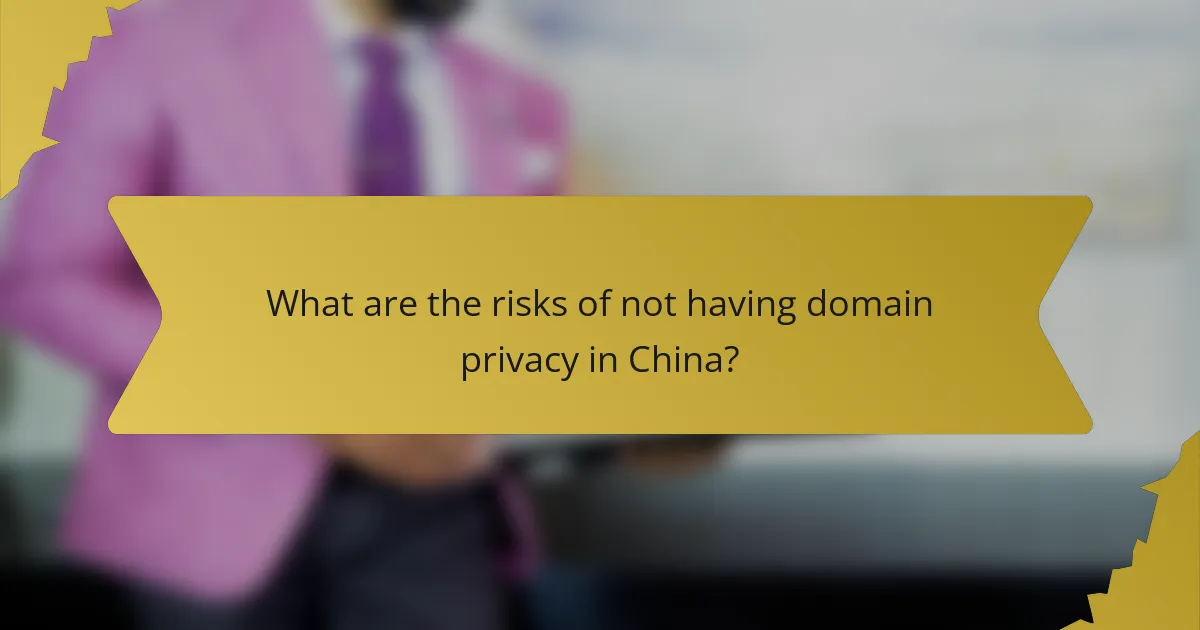
What are the risks of not having domain privacy in China?
Not having domain privacy in China exposes individuals and businesses to various risks, including increased spam and potential legal issues. Without privacy protection, personal information related to domain registrations can be publicly accessible, leading to unwanted consequences.
Increased spam and phishing attacks
Without domain privacy, your contact information can be harvested by spammers and cybercriminals. This often results in a surge of unsolicited emails and phishing attempts aimed at stealing sensitive information.
To mitigate these risks, consider using a domain privacy service that masks your personal details. This can significantly reduce the volume of spam and protect you from malicious attacks.
Legal repercussions
In China, failing to protect your domain information can lead to legal challenges, particularly if your domain is misused or associated with illicit activities. Authorities may trace back to your personal details, which could result in fines or other penalties.
It’s crucial to understand local regulations regarding domain registration and privacy. Engaging with a reputable registrar that offers privacy protection can help shield you from potential legal issues.
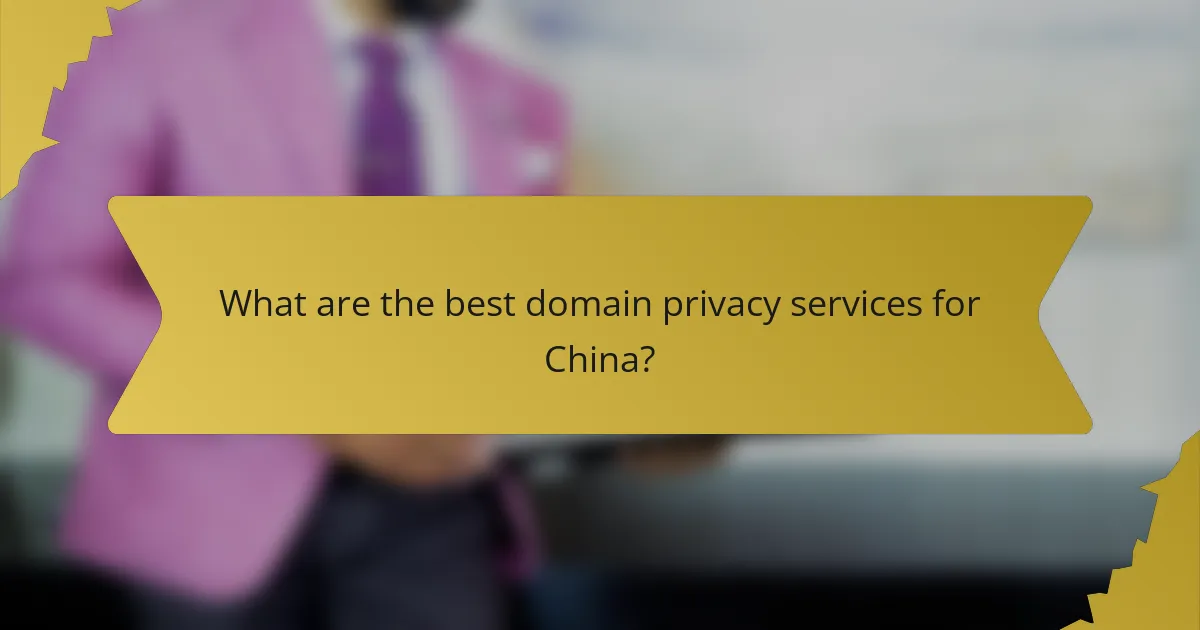
What are the best domain privacy services for China?
The best domain privacy services for China include options that protect your personal information while complying with local regulations. These services help keep your registration details confidential, reducing the risk of spam and identity theft.
Namecheap
Namecheap offers a robust domain privacy service that masks your personal information from public WHOIS databases. This service is particularly beneficial for users in China, where privacy concerns are paramount.
With Namecheap, you can expect features like free WHOIS privacy protection for the first year and affordable renewal rates thereafter. They also provide a straightforward setup process, making it easy to secure your domain information.
GoDaddy
GoDaddy provides domain privacy protection that helps shield your personal data from being publicly accessible. Their service is designed to comply with international privacy standards, which is crucial for users operating in China.
GoDaddy’s privacy service includes features such as email forwarding and the ability to manage your domain settings without revealing your personal contact details. While their pricing may vary, it typically includes a nominal fee for privacy protection, which is a worthwhile investment for maintaining anonymity online.
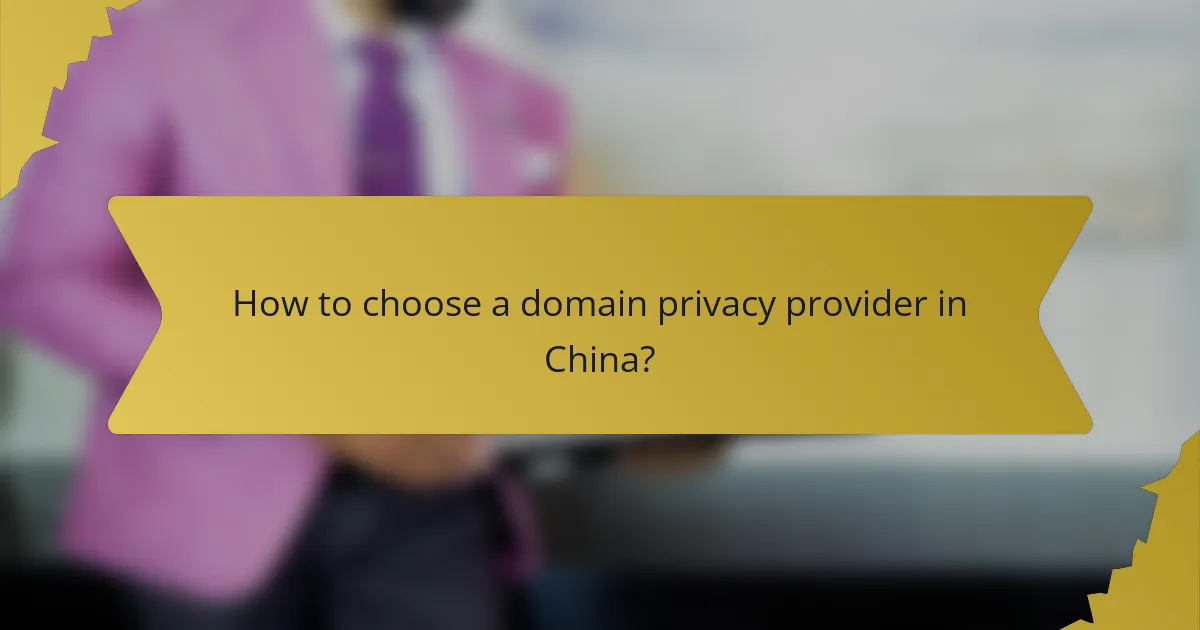
How to choose a domain privacy provider in China?
Choosing a domain privacy provider in China involves assessing features, reputation, and compliance with local regulations. It’s essential to select a provider that safeguards your personal information while ensuring adherence to Chinese internet laws.
Evaluate service features
When evaluating service features, consider what privacy protections are offered. Look for features such as WHOIS privacy, domain ownership protection, and secure data handling practices. A good provider should also offer easy management tools for your domains.
Additionally, check if the provider includes features like email forwarding, DNS management, and support for multiple domain extensions. These can enhance your overall experience and provide added value.
Check customer reviews
Customer reviews are crucial in assessing the reliability of a domain privacy provider. Look for feedback on their customer service, ease of use, and how effectively they protect user data. Platforms like Trustpilot or local forums can provide insights from actual users.
Pay attention to recurring themes in reviews, such as responsiveness to issues or transparency in pricing. This information can help you avoid providers with poor reputations and ensure you choose a trustworthy option.
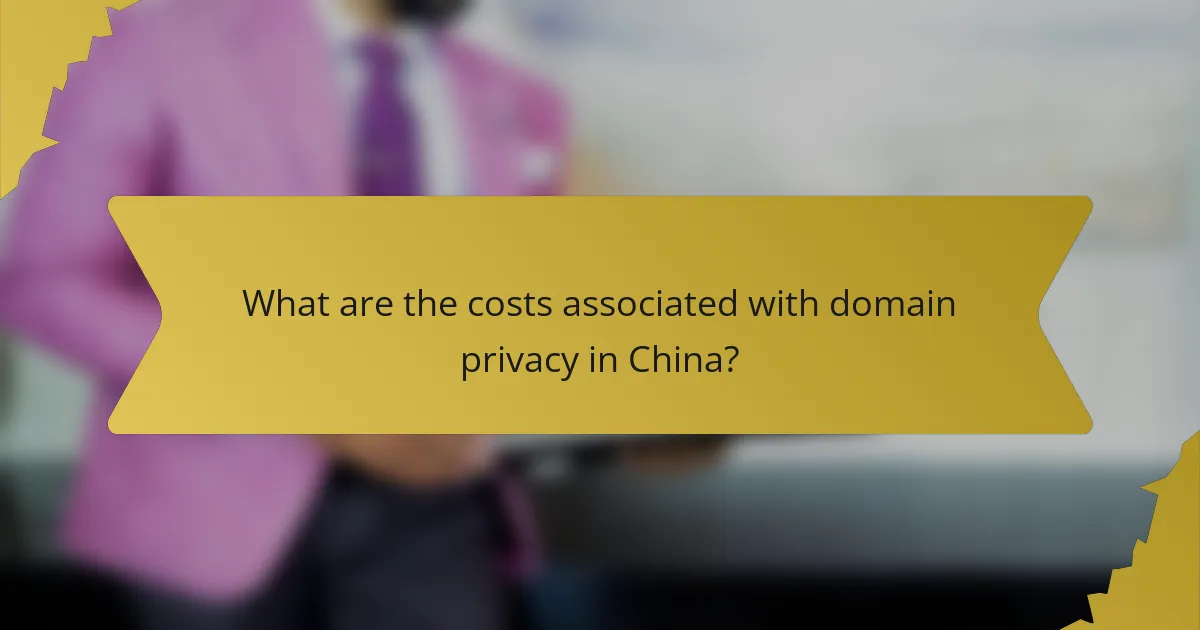
What are the costs associated with domain privacy in China?
The costs associated with domain privacy in China can vary significantly based on the registrar and the level of privacy protection chosen. Generally, these costs include annual fees for the service and potential additional charges for enhanced features.
Annual fees
Annual fees for domain privacy in China typically range from a few hundred to over a thousand Chinese Yuan (CNY), depending on the registrar and the specific privacy features offered. Basic privacy services may be on the lower end, while comprehensive protection that includes legal support and additional security measures can be more expensive.
When selecting a provider, consider the overall value of the service offered. Some registrars bundle domain registration and privacy services, which can lead to cost savings compared to purchasing them separately.
Additional service charges
In addition to annual fees, there may be extra charges for specific services related to domain privacy. These can include fees for transferring domains, restoring privacy after a lapse, or adding features like email forwarding and enhanced security protocols.
It’s essential to read the fine print and understand all potential costs before committing to a registrar. Some providers may advertise low initial fees but have higher additional charges, which can affect the overall cost of maintaining domain privacy.
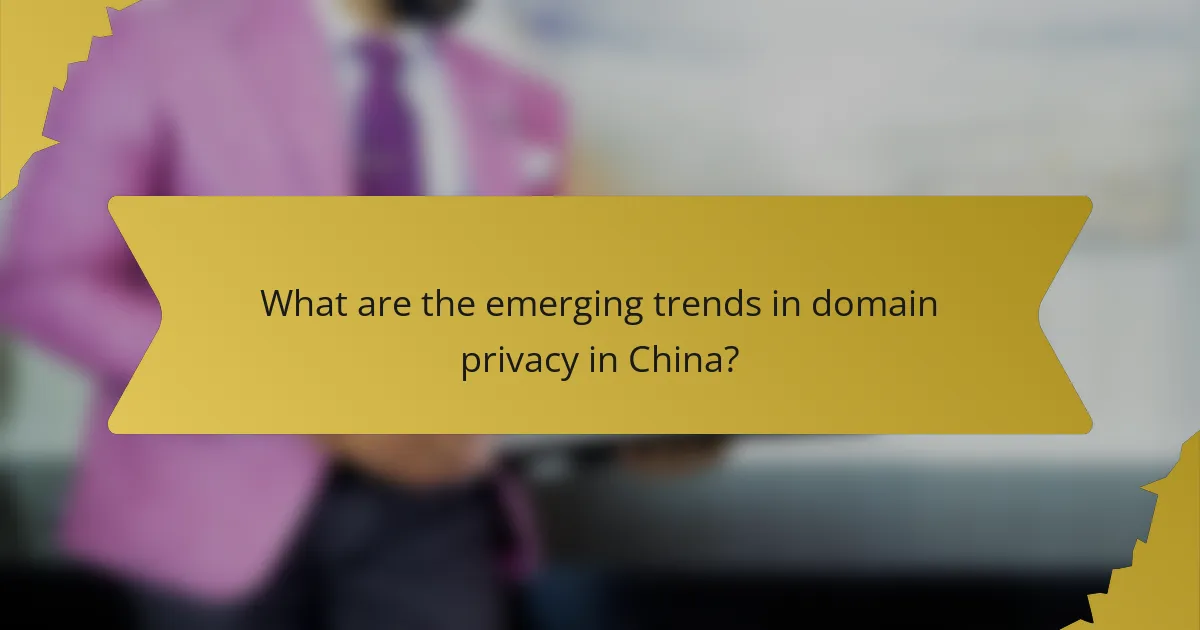
What are the emerging trends in domain privacy in China?
Emerging trends in domain privacy in China are characterized by heightened regulatory scrutiny and increased demand for privacy protection among businesses and individuals. As the digital landscape evolves, understanding these trends is crucial for maintaining compliance and safeguarding personal information.
Increased regulatory scrutiny
The Chinese government has implemented stricter regulations regarding domain privacy, aiming to enhance data protection and user privacy. This includes more rigorous verification processes for domain registration and increased penalties for non-compliance.
Businesses must ensure that they are adhering to the latest regulations, which may involve regular audits and updates to their privacy policies. Failure to comply can result in significant fines or even the suspension of domain services.
To navigate this landscape, organizations should stay informed about regulatory changes and consider consulting with legal experts specializing in Chinese internet law. This proactive approach can help mitigate risks associated with domain privacy violations.
